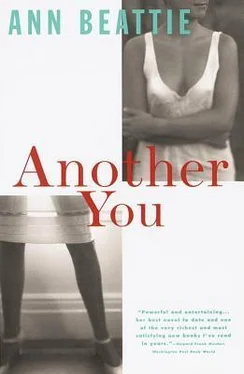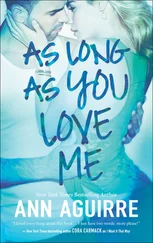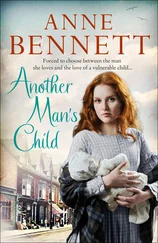Ann Beattie - Another You
Здесь есть возможность читать онлайн «Ann Beattie - Another You» весь текст электронной книги совершенно бесплатно (целиком полную версию без сокращений). В некоторых случаях можно слушать аудио, скачать через торрент в формате fb2 и присутствует краткое содержание. Год выпуска: 2014, Издательство: Vintage Books, Жанр: Современная проза, на английском языке. Описание произведения, (предисловие) а так же отзывы посетителей доступны на портале библиотеки ЛибКат.
- Название:Another You
- Автор:
- Издательство:Vintage Books
- Жанр:
- Год:2014
- ISBN:нет данных
- Рейтинг книги:5 / 5. Голосов: 1
-
Избранное:Добавить в избранное
- Отзывы:
-
Ваша оценка:
- 100
- 1
- 2
- 3
- 4
- 5
Another You: краткое содержание, описание и аннотация
Предлагаем к чтению аннотацию, описание, краткое содержание или предисловие (зависит от того, что написал сам автор книги «Another You»). Если вы не нашли необходимую информацию о книге — напишите в комментариях, мы постараемся отыскать её.
Another You — читать онлайн бесплатно полную книгу (весь текст) целиком
Ниже представлен текст книги, разбитый по страницам. Система сохранения места последней прочитанной страницы, позволяет с удобством читать онлайн бесплатно книгу «Another You», без необходимости каждый раз заново искать на чём Вы остановились. Поставьте закладку, и сможете в любой момент перейти на страницу, на которой закончили чтение.
Интервал:
Закладка:
“I won’t drink it all before they show up,” he said.
“Oh. No,” she said, blushing again, as if she’d actually had such a concern.
Then she was gone, relieved to be away from him, no doubt. He looked around. The barometer on the wall indicated rain or snow, the needle right on the line between the two. Outside, the sky was gray. It didn’t look like a snow sky. He sat in one of the brown leather chairs, thinking how inelegant all of this was. The room was a shabby, cheap imitation of an English library, with bookshelves that contained more magazines than books, and a rug that looked like Jackson Pollock had been recruited, in the last thirty seconds of the rug’s creation, to drizzle some color over its grayness.
“Hello, hello,” President Llewellyn said, extending his hand. “It’s just terrific that you could make time in your schedule to see us. Marshall, may I introduce Mrs. Barrows. She’s the mother of Darcy Barrows, whom I know you remember fondly. Mrs. Barrows, Marshall Lockard.”
“Oh, this is such a pleasure,” Mrs. Barrows said. “All of it. The library. Dean Llewellyn’s lovely office with that magnificent sunlight streaming in. I hoped it would last, too, but the weather can’t be trusted this time of year. Hello, Professor Lockard. You have inspired my daughter and made her the art-conscious young woman she is today. Not a day passes that she doesn’t read to me and to Adam from her poetry manual.”
“That’s—”
“It’s a wonderful thing. That’s what it is,” President Llewellyn said, gesturing for Mrs. Barrows to sit. “What’s that song?” President Llewellyn said. “ ‘It’s a great big wonderful world we live in’?”
“But it isn’t!” Mrs. Barrows said, as excited as if it were. “How does anybody get along now, with so many pressures from within and from without?”
Marshall looked at President Llewellyn. President Llewellyn looked at the sherry bottle and moved so quickly Marshall had the feeling the bottle might be knocked out of the field if the President didn’t stop it. It was a quick catch. In seconds, the cap was unscrewed.
“Ice, Mrs. Barrows?” the President asked.
“ ‘Some think the world will end in fire, some think in ice,’ ” Marshall recited.
The President shot him a dirty look, but it faded when Mrs. Barrows said, “Robert Frost!”
“ ‘Stopping by Woods on a Snowy Evening,’ ” Marshall said, as if Frost’s name were an association test.
“ ‘My little horse must think it queer!’ ” she called out.
“ ‘Whose woods are these? Whose woods these are I think I know,’ ” President Llewellyn said, not to be outdone.
But what he said ended the exchange. Marshall sat with his hands on the chair arms, smiling. He had decided to pretend that this was a 1940s movie and that he was a famous, wealthy man in his study, and that two mad people had come to call. The movie would be a comedy.
“Now tell me,” Mrs. Barrows said, turning to Marshall, as the President put a glass of sherry on the table near her chair. “Harvey sucks” was carved on the tabletop, but Mrs. Barrows didn’t see it, because Barbara had placed a doily over the scratched words. “Tell me if there is even a teeny, tiny chance that you remember Darcy Barrows.”
“Do you have a photograph?” he said.
The President glared at him, slightly upset, slightly encouraging. It was the look of someone who had bet a lot of money on a horse, watching that horse mysteriously and improbably come to a complete stop.
“She used to say that Bob Dylan was a poet, but I never did believe that,” Mrs. Barrows said, nodding as if she had adequately answered Marshall’s question.
“Then whom do you most like to hear sing?” Marshall said. (Butler! Please show these delightful people out now.)
“Kiri Te Kanawa,” Mrs. Barrows said.
She went up a notch in his estimation. As did the President, for dropping out of this Theater of the Absurd conversation as quickly as possible.
“And what do you think of the plays of Harold Pinter?” he asked, gesturing behind him as if they were shelved in the bookcases, instead of what truly interested college students: old Time magazines and books of Garfield cartoons.
“The inability of people to communicate,” Mrs. Barrows said. “It is a challenging problem.”
“If you were to offer us the funds to hire a poet,” Marshall said, “I would insist that you, personally, introduce that poet at the reading he or she would give when they arrived on campus.”
“My goodness!” Mrs. Barrows said. “Why, I have no training. I only know what I like.”
“Then I’d be happy to help you focus your ideas as you’re writing the introduction,” Marshall said.
President Llewellyn watched this volley as if he were watching a tennis match in slow motion. His own glass of sherry was empty.
“Tell me the truth now: Do you remember my Darcy?” Mrs. Barrows said.
“If you don’t have a picture, I don’t have a story,” Marshall said, smiling, as if he’d made a great joke.
She shook her finger at him and picked up her purse. She un-snapped it and unzipped a pouch inside. From the pouch she took a small leather folder. Inside, behind the plastic on the first page, was a photograph of a rather plain, round-faced, brown-haired girl. It was only her headband that made him remember her. Darcy Barrows: that tall, shy girl who sat front row center, never speaking unless called on. The girl who wore headbands with little plastic animals on them, or sparkling stars. Five or six years ago: Darcy Barrows.
“I see from your eyes you remember,” Mrs. Barrows said. “The eyes can never hide a lack of recognition.”
“She sat in the first row. I guess she did like my class,” he said.
“And do you know, she lives one and one quarter miles from my husband and me, and every day she doesn’t visit — with my grandchild, I might add! — she phones and reads us a poem.”
“You couldn’t ask for more as a teacher,” he said.
“Inspirational,” the President said.
“I think Darcy Starflyx should give the introduction!” Mrs. Barrows said.
“Her married name?” the President said.
“Her stage name?” Marshall said.
She ignored the President and poked her finger at Marshall: her sign that he was being funny, but naughty.
Which he continued to be for another ten minutes, before the President, who was still puzzled about how things had gone so well when they had seemed so bizarre, stood and announced that they must “firm up the details” in his office and have Mrs. Barrows on her way well before dark.
(Butler! See that these people are pointed in the right direction.)
On the way out, Marshall picked up his mail. Maybe he should be an actor, he thought. But his performance had only been so good because Mrs. Barrows had been so good. Probably, if he had tried this act without her, he would have been about as funny as the Marx Brothers with no foil. In her way, Mrs. Barrows had been as charmingly perplexed as Margaret Dumont. All in all, a surreal afternoon. He looked at the junk mail and decided that no, the perfect finale to the day would not be having radial tires put on the car at a 10 percent faculty discount.
“Hey, Mr. Lockard, way to go,” a student said as he passed him on the stairs. The things the students said in greeting were formulaic, but didn’t really mean anything. The English language could be abandoned entirely. People could communicate by grunts. The graffiti were already everywhere, the new hieroglyphics. Words could be restricted to bathroom walls. Texts could be dispensed with. All right! as the students said. All fucking right.
In the parking lot, a girl in sweatpants and a blue parka was running in a widening circle, guiding a yelping puppy on a leash.
Читать дальшеИнтервал:
Закладка:
Похожие книги на «Another You»
Представляем Вашему вниманию похожие книги на «Another You» списком для выбора. Мы отобрали схожую по названию и смыслу литературу в надежде предоставить читателям больше вариантов отыскать новые, интересные, ещё непрочитанные произведения.
Обсуждение, отзывы о книге «Another You» и просто собственные мнения читателей. Оставьте ваши комментарии, напишите, что Вы думаете о произведении, его смысле или главных героях. Укажите что конкретно понравилось, а что нет, и почему Вы так считаете.












